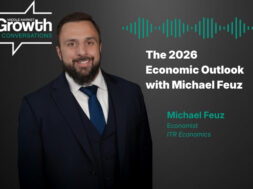Optimizing Private Credit Partnerships
For business owners, selecting the right private capital partner is essential for growth, alignment of interests and long-term success

Private credit has caught the attention of many privately held companies seeking to raise capital without meaningfully diluting their ownership. For business owners, selecting the right private capital partner is essential for growth, alignment of interests and long-term success.
The growth in the private credit market can be traced back to the decline in bank lending. The dramatic rise in interest rates in 2022 caused significant deterioration in banking conditions. Elevated borrowing costs put pressure on regional banks that were already credit constrained, resulting in a pullback in lending. The reduction in bank lending increased the demand for alternative or “non-bank” lenders. The private credit market stepped in to fill the lending gap and is now estimated at $1.7 trillion and growing.
This section of the report is sponsored by Turning Rock Partners and originally appeared in the Fall 2024 issue of Middle Market Executive.
Traditionally, private credit was dominated by sponsor-backed lending, focusing on dividend recapitalizations or traditional leveraged buyouts. The non-sponsor lending market has now emerged as a dynamic and attractive alternative. Non-sponsor lenders provide capital directly to businesses seeking loans. Founder-led companies often prefer private credit investment, as it can be less dilutive by keeping equity in the hands of the business owner and his or her key executive teams.
Working With Private Credit Partners
With so many new entrants into the private credit market, finding the right financing partner is essential. What do private credit investors look for in underlying companies?
Founder competency: Private credit investors are looking for sophisticated founders and executives who understand all facets of their core business. If we get the sense this is more of a passion project or a side hustle, then we are moving on. We also want to see the depth of the team. The founder should have aligned incentives, roles and responsibilities for key players on the bench.
Skin in the game: Founders who have substantial dollars on the line, reinvest dividends and invest most of their own capital into the company are far more attractive to potential private credit partners. We also review management incentive plans, employee compensation and benefits.
Use of proceeds: What is the use of our capital? We prefer to see founders and ownership teams utilize the funds to recap the company, expand their footprint, invest in critical equipment, make strategic acquisitions or expand into new business lines.
Track record: An essential element is management that has achieved definable and repeatable success in scaling operations. While not a guarantee, our experience has been that those businesses with asset-heavy balance sheets, definable cash flow, diversified revenue streams and expert management tend to have better outcomes. Companies with executive boards of directors that are diverse, inclusive and made up of industry experts and independent thinkers are preferred.
Strategic exits: Before we invest, we are already planning our path to exit. It is critical that the founders we partner with are on board with our outcome goals. Founders should be receptive to exploring a range of exits such as M&A, refinancing, asset sale proceeds or even tapping the public markets. Our networks can play a vital role in pursuing the next chapter.
Strong Partners in Challenging Times
Private credit firms are choosing their investments carefully in today’s challenging market. The upside is that owner-led companies typically perform well in uncertain times. Now more than ever, business owners can benefit from strong investment relationships with private capital partners who can help them weather shifting macroeconomic and regulatory environments.
Maggie Arvedlund is CEO and Managing Partner at Turning Rock Partners.
Middle Market Growth is produced by the Association for Corporate Growth. To learn more about the organization and how to become a member, visit www.acg.org.


